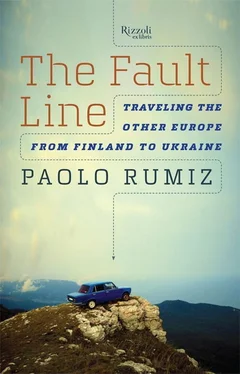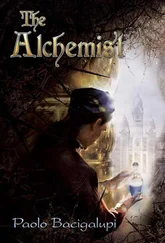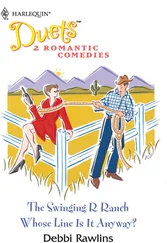I’d be happy to stay here and confabulate until morning, but my eyelids are dropping like roll-down shutters, and I retire to the attic with Monika, on two ramshackle beds with springs, in a freezing-cold room, far away from the maternal warmth of the stove on the ground floor. It’s a cold for long underwear, which I don’t have. My lightweight sleeping bag offers a precarious refuge, twenty-eight ounces of salvation folded up in the bottom of my backpack that, when opened, creates an air space sufficient for survival. Sleeping without a wool cap is unthinkable, so I slide mine over my balding head down to the tip of my nose. There’s a bucket of lake water in the hallway for washing face and hands and cleaning the pit toilet behind the little door of a draft-filled water closet. But in these temperatures, hygienic rites are performed in a hurry, and I know as soon as I get into it that I won’t be leaving my den until eight tomorrow morning.
The wind whistles through the cracks; the chaika s sail over the roof, screeching. With even the slightest movement, the bed twangs like an out-of-tune piano. Maybe that’s why one of the wolf-man’s four cats, a sly little Russian devil, decides to sit on my feet and huff. I don’t know how, but I sleep like a rock, dreaming in Cyrillic.
In old Russia, don’t let yourself be fooled by the phrase “go to see the neighbors.” It can involve walking for miles. Mariusz and Natasha’s neighbors live in the locale of Sibovo, the most godforsaken village on the lake, about four miles from Wilk’s house, reachable only by a mud path where you have to go on foot or with an off-road vehicle. The izba is caulked like a boat, and the lady of the fire is Vala Fyodorovna, a robust woman, cheerful and vivacious. As soon as she sees us pop out of the woods, she runs inside to put out on the table everything she has: candies, smoked fish, marmalade, brown bread, and butter.
Then she goes to stoke the fire, but not without asking me my father’s name. To us it might seem like a superfluous curiosity, but for Russians to get to know you, they must absolutely know this fragment of your genealogy. They are sure that behind every name, and especially behind a patronymic, there is a saint, a miracle, a story. A key to your personality.
“My father’s name was Pyotr. And I am Pavel Petrovich.”
Vala responds with a big Russian smile. Then she goes to check on the bread that’s rising in the pechka . She dances around the fire with the skill of a midwife, handling the baker’s shovel as though it were a pair of forceps, then comes to the table with a samovar that’s huffing, puffing, and whistling like a locomotive. Her husband, Jura, has already gulped down two glasses of vodka and is talking happily about the growth of the beets in his garden. He goes into town only to buy salt, sugar, cigarettes, and vodka. Everything else he makes at home. For fish, there’s the lake, and in Russia, with all that water, fish is not something you buy but something you catch. Especially at this time of year.
The house is bubbling over with that slightly manic gaiety that bursts out in the brief Northern summers, when all farming activity is condensed into three months.
Vala: “I’m fifty-eight years old and I feel young. And with a mad desire to go to Italy.”
Her husband, laughing: “I’m sixty-two, and if you go to Italy by yourself, I’ll hit you in the head with a hammer and send you to your grave.”
She’s holding an icon. “You see this, Pavel Petrovich? This is the only survivor of the many that we used to have around here. Thirty years ago, some tourists came from Moscow. They got drunk, robbed the icons from the church, and then set fire to it.”
He changes the subject: “Our cat has disappeared. He was perfect for mice. Now I don’t know how to find a new one. Kubais, his name was, after one of Yeltsin’s corrupt ministers. You can’t imagine how nasty he was. The minister, I mean, not the cat. He stole everything we had. The treasury bonds he made me buy I ended up selling for two bottles of vodka.”
Vala has a brief conversation on her cell phone. Then she explains: “You know? I can only answer calls with this damn thing. I can’t make a call with it; my fingers are too big. One time I pushed three buttons at the same time and it stopped working. The people at the store couldn’t understand how I’d done it.”
Jura: “Today I have to plant the potatoes and buy some firewood. I’d better get to work.”
I ask him why he has to buy firewood when the place is surrounded by woods.
The dialogue starts to flow fast and furious. Monika translates as fast as she can, between a piece of candy and a cup of tea with honey, while the fire crackles with seasoned birchwood.
“Good question. The woods used to be owned by the state, and then that effing privatization policy came along.”
Vala reprimands her man: “Watch your language!” Then, turning to me, “You know? Last fall I saw some bear tracks right outside the house. There was fresh snow on the ground and the prints were clear. I knew it was a bear because the dog was barking in a strange way.”
Jura: “I swear I wasn’t drunk that night. When I went out and saw those footprints in the moonlight, I said to myself, Who is this crazy guy walking barefoot in the snow? Bear prints look exactly like human feet!” Everybody laughs, including old Katya, just arrived from town for a visit, with some pastries and a big lemon for the tea, which fills the room with the aroma of the Mediterranean. Vala points at her husband. “You see that guy there? When he was courting me, he had to row fifteen miles across the lake. When I wanted to see him, I would steal a horse from the kolkhoz [collective farm] and ride ten miles at a full gallop. That was desire. Today, with their cell phones, they have no idea what desire means.”
Jura: “I’ll say! Just thinking about it makes me want to take another roll in the hay.”
She laughs. “What can you do, Pavel Petrovich? That man and I have been together for thirty-eight years. And Jura is a real muzhik. There aren’t any more muzhiks among the young people today. Jura Fyodorovich was born here, on this pechka . His father pulled him out of the birth canal, not some midwife.”
Jura, who has had a little too much to drink: “What are we effing talking about? Bears? Horses? Children? I’m totally lost.”
More laughter, then a toast just between us men.
We talk about the kolkhoz, which turns out not to have been so bad. Vala: “My brigade was good. Cows, potatoes, and good schools. Today there aren’t any cows, nobody grows potatoes, and the schools don’t teach anything worthwhile. The kolkhoz is finished, and the countryside is finished, too. Look how overgrown it all is. The cowsheds are all closed. It makes my heart ache to see how bad things are. But who wants all of this?”
Jura: “But come on over to have yourselves a sweat in our banya ! You can’t live without a banya . We’re crazy about it; as soon as we can, we fire it up. It’s not only a way to get washed. It’s our culture.”
I ask how you can tell if it’s too hot.
Jura: “Easy, when your ears roll up. Then you have to throw yourself on the floor, where the temperature is cooler. And cover your head with a wool cap.”
Vala: “But in Italy don’t you have the banya ?”
No, I tell her. At most, there are saunas.
“But how can you live without it? It tempers the body. If you use it right, you never get sick, I swear. Last year my husband didn’t do it, and he got sick right away. The sauna isn’t the same. There’s no lake to jump into afterward.” Turning to her grandson, who has just come in. “Just think, Vadim. In Italy they don’t have the banya !”
Читать дальше












